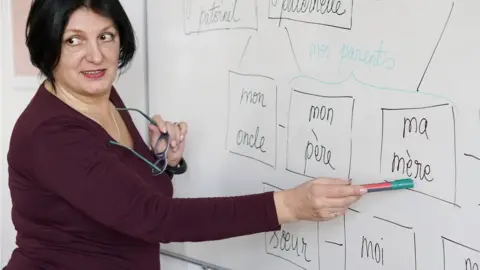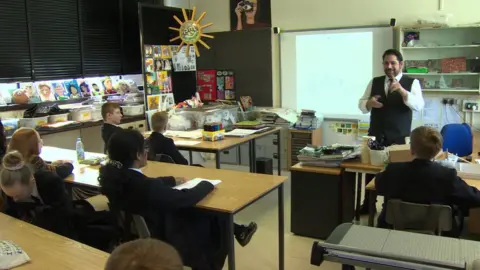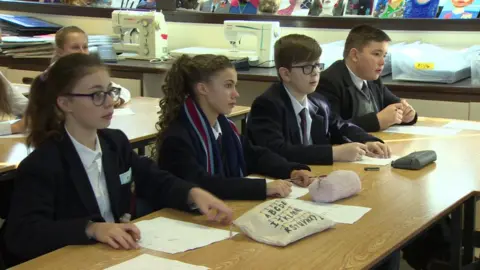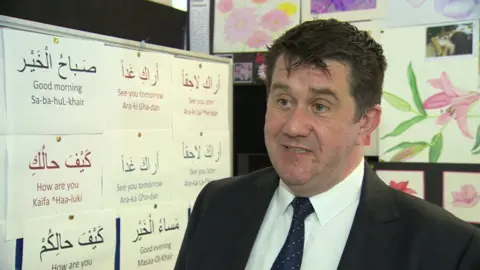French, German or Spanish offered by fewer NI schools
More than a third of schools in Northern Ireland have stopped offering French, German or Spanish at GCSE in the past five years, a BBC survey suggests.
Some 117 post-primary schools responded - more than 60% of NI schools.
Separate exam figures also show the number of pupils taking modern languages at GCSE here has fallen by more than 40% in the past 15 years.
The BBC survey findings in Northern Ireland echo those across the UK.
 BakiBG/Getty
BakiBG/GettyThe wider survey suggests learning foreign languages at school has hit an 18-year low.
The BBC Schools Language Survey asked schools across the UK what has had the biggest impact on languages in the past five years.
In Northern Ireland, almost 90% of the 117 schools that responded said there was a perception that the courses and exams were too difficult.
More than half said pupils were less interested in studying languages.
Almost half who responded (45%) said there had been a cut in the number of specialist language teachers in their school over the past five years.

Three-quarters of schools who responded in Northern Ireland reported that their budget for teaching foreign languages had been cut in the same period.
Meanwhile, separate figures from the Joint Council for Qualifications (JCQ) show a decline in exam entries in many languages.
French saw a particularly dramatic fall, with 4,301 GCSE entries in 2018 compared to 12,647 in 2003.
However, the number of entries for Spanish GCSE had risen from 3,206 to 3,817 in the same period.
Only 110 pupils took A-level German in 2018 and only 429 took A-level French.

Meanwhile, GCSE entries in Irish have remained relatively stable while there has been a slight increase in the number of pupils sitting the subject at A-level.
About 2,000 pupils took GCSE Irish in 2003 while 1,991 took it in 2018.
Just under 300 took Irish to A-level in 2003, while 332 took Irish A-level in 2018.
Syrian refugees
Some post-primary schools, like Belfast Royal Academy, have begun to teach other languages.
It works in partnership with the British Council and Qatar Foundation to teach many pupils Arabic.
Some of the school's students also travel to the Conway Education Centre in west Belfast on a regular basis to exchange language skills with Syrian refugees.
Paul Porter, who teaches languages in the school, said Arabic was important for business and future trade.
"It actually opened up a whole new world of understanding Arabic culture and language," he said.
"We've worked with Invest NI and they've told us the amount of investment that is already there between companies in Northern Ireland and countries that are Arabic-speaking and the lingua franca is going to be Arabic," he added.
'French has declined'
"Therefore, to give our businesses a stand with businesses outside the European Union post-Brexit these countries are very important.
"Our children also get a wider appreciation of the people who come from Arabic-speaking countries and their culture and their new life here."
Mr Porter said Spanish and German had become more popular among pupils at GCSE in the school, but interest in French had declined.
"French has always had a position of appearing to be a difficult GCSE to get a good grade in, so students are voting with their feet," he said.

"STEM subjects have become so important and we're seen as the lesser relations of the STEM subjects.
"But employers and industry experts tell us we need languages," he added.
All mainstream state secondary schools and sixth form colleges in the UK were sent the BBC online survey.
This is a total of 3,921 schools, based on the most recent schools data from government departments in England, Scotland, Wales and Northern Ireland.
More than 2,000 of these schools (2,048) took part in the survey, representing more than half of the total in each nation and the UK as a whole.
